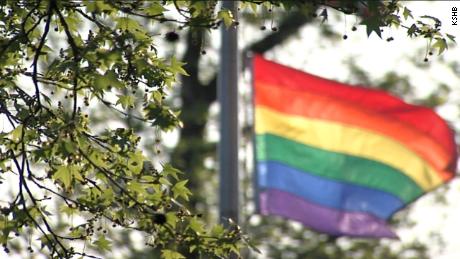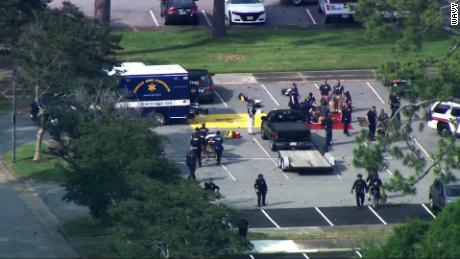
Speaking at a news conference after the mass shooting that killed 12 and left four injured, Virginia Beach Mayor Bobby Dyer called Friday evening his city’s “darkest hour,” and police Chief James Cervera vowed his department would say the shooter’s name — only once, before keeping his city’s focus squarely on the victims.
Jonathan Wackrow tweeted, “When it comes to addressing mass-shooting incidents, we need to develop a new model to address these senseless acts of violence.”
Jill Filipovic concurred, challenging leaders and citizens alike: “Another 12 innocent people have been gunned down. Don’t just nod along as politicians issue their thoughts and prayers.” America needs everyone at the table to find a way forward, Filipovic emphasized: ”
We, as a country, face a choice. Every gun owner and gun proponent faces a choice.”
On Wednesday, the special counsel surprised everyone by announcing he’d be making a statement to the press at 11 a.m. He told reporters he was resigning from the Justice Department and emphasized passages from his famous report. “There were multiple, systematic efforts to interference in our election,” he said, with the tone and posture of an exasperated college professor surrounded by unprepared students, “and that allegation deserves the attention of every American.”
But he said much more, and by Wednesday afternoon, Mueller Time was again in full swing, with Democrats, Republicans, pundits and the Twitterverse parsing his word cocktail.
packed a punch, wrote
Frida Ghitis: “Reading between the lines, Mueller appeared to suggest that if he had not been shackled by Department of Justice regulations, the special counsel would have indicted the President. He said: ‘If we had confidence that the President clearly did not commit a crime, we would have said so.’ ”
Michael D’Antonio suggested the bottom line was clear: “If you follow Robert Mueller’s words,” he wrote, “they lead to one conclusion: House Speaker
Nancy Pelosi has no choice but to begin the process of impeaching President Donald Trump.”
Carrie Sheffield,
rejecting impeachment as “divisive for the nation and a boon to our global competitors.” Mueller is moving on, she pointed out, and Democrats should recognize that it’s time for them — and the rest of us — to turn the page.
Another smart take:
King Trump?
If it seems like Mueller Time will never end, the same could be said for Trump’s feud with the late Sen. John McCain. The Wall Street Journal reported Wednesday evening that White House staff had asked Navy officials to keep the USS John McCain out of Trump’s line of sight during his recent visit to Japan — and when that didn’t work, to cloak the ship’s name with a tarp and later a work barge. (Trump denied Thursday knowing about the plan, which the Navy confirmed Friday, but according to the Journal, Trump also defended the official who ordered the ship out of sight.)
Helaine Olen put it in The Washington Post, “Trump’s feud with McCain perfectly captured the former’s thin skin.” She suggested the whole affair
smacked of efforts under Stalin to strike dissenters from the historical record: “It was a form of rewriting history by erasing it from existence. Trump, it is obvious, would like to do the same.”
Diane H. Mazur criticized “the latest breach of America’s civil-military tradition of political neutrality”: the “Make Aircrew Great Again” patches some service members aboard a US Navy ship docked there were wearing as a play on “Make America Great Again.”
This type of violation is particularly troubling, Mazur elaborated, because this President “isn’t asking for military advice. He’s asking for applause, for affirmation, for a pledge of personal loyalty on a decision he has already made in his own mind.”
Ted Gup, is that it
constitutes abdication: “For the foreseeable future the presidency will be both vacant and occupied, with the country reduced to waiting out his tantrum and deciphering its future from a fusillade of tweets and campaign-like rants.”
More smart takes:
How Justin Amash’s one-man revolt against Trump could gain steam
The last abortion clinic in Missouri gets a reprieve … for now
Carliss Chatman. It is: to “avoid making a decision unless it is absolutely necessary.” That was
Chatman’s interpretation of the court’s 7-2 decision to uphold an Indiana law requiring health care facilities to bury or cremate fetal remains — while declining to consider a portion of the law banning abortion providers from terminating pregnancies on the basis of fetal characteristics such as gender, race or disability diagnosis. She surmised, “(The) justices are signaling that the recent draconian abortion laws will not succeed in overturning settled law on a woman’s right to abortion.”
Rafia Zakaria, such a backdoor defense of Roe
may not make any difference. Missouri, for example, was on the cusp of becoming the first US state with no clinics providing abortion care after a showdown Friday between the state’s last abortion clinic and its health department over renewal of an operating license ended in reprieve. A temporary injunction will last until Tuesday, but as Zakaria wrote, the red-tape standoff is telling: “The message in all of it is clear; whatever federal courts may do, local officials can create all kinds of hurdles that cause clinics such as this last one, to stop offering abortion care or close their doors entirely.”
Rob Schenck explained why
his faith prompted him to abandon his anti-abortion stance: “As I’ve preached countless times, loving our neighbors means meeting them where they are, not where we want them to be. … To my former allies who are cheering on the challenges to Roe, I say: Put your money where your mouth is. Devote yourself and your considerable resources to taking care of poor women and their children before you champion laws that hem them into impossible situations.”
Death, drama and … the census?
Raul Reyes responded to a New York Times report revealing that files found on the hard drives of late GOP strategist Thomas Hofeller — by his estranged daughter after his death last year — showed he wrote the key portion of a draft letter that the Department of Justice used to maintain that including the citizenship question on the census (an issue pending before the Supreme Court) was needed to help enforce the Voting Rights Act.
insisted.
A red-and-blue America hoists a rainbow flag
Across the world, people are observing the start of Pride Month, an especially poignant occasion as June 28, 1969, marks the 50th anniversary of the historic uprising at the Stonewall Inn in Greenwich Village, recognized as a turning point in the global movement for LGBTQ rights.
even in the reddest of red states,
Samantha Allen wrote. Utah, for example, “is becoming a strange and deeply imperfect LGBTQ pioneer” whose “stark contrasts and political unpredictability aren’t a sign of a state in an identity crisis … (but) simply the growing pains that we can expect the country at large to go through as we move toward full LGBTQ equality.”
Jennifer Butler
preached that Christian love is a challenge — to stand up to perverse politics — not a weapon to sideline the marginalized further. And she rejected a Trump administration effort to roll back anti-discrimination health care provisions for transgender Americans and Americans who have previously undergone an abortion.
Everest is more than a mountain
Jill Filipovic. Nepal’s government, guide companies and ultimately, the climbers themselves share responsibility. “Everest is a dream for many,” Filipovic observed, but
not every dream should be realized — especially when it risks others’ lives. “You don’t have to scale a mountain to live out a dream if what you aspire to is a life rich with experience,” she concluded.
Rowan Williams wrote in The New York Times
on the question of power, “(H)uman beings still have the ability to put themselves right with the power that lies around them. Such ability depends on their readiness to loosen their grip on the world that is crushed and torn by the force of their holding.”
H-I-S-T-O-R-Y in the making
Shalini Shankar
spent six years doing research on spelling bees and talking to parents of competitors. Gen X parents are embracing an approach increasingly focused on competition and resilience, Shankar observed, attributes “on full display at the National Spelling Bee championship finals.”
Meagan Francis, writing for NBC Think, argued her child has better things to do than
ritualize memorization skills. Over at The Washington Post,
Theresa Vargas
called a halt to the parental grumbling and backlash about the “octochamps,” insisting: “To them and the many other naysayers of the Bee, I have one word for you: Enough. … Enough with calling for the end of a competition that, if nothing else, makes us pause for a few days each year to think about language.”
An athlete’s (and parents’) worst nightmare was avoidable
Competing comes with risks, something organizers of professional sports must heed more closely, argued Jeff Pearlman after a ghastly accident where a line-drive foul ball hit by a Chicago Cubs player struck a child.
maintained that Major League Baseball could — and should — be doing more to avoid fan injury.
Some stories just stay with us
Meredith McCarroll, a scholar of Appalachia and co-editor of a book rejecting the monochromatic interpretation of the region offered by JD Vance’s “Hillbilly Elegy,”
offered her own remembrance. She wrote movingly of how — after decades of documentary exploitation of the region — Bourdain’s episode of “Parts Unknown” set in West Virginia resisted becoming “poverty porn.” Instead, what he offered viewers was an authentic portrait rendered by an outsider who asked, “What do I need to know about this place?” — and then truly listened for the answers.
Paul Callan, who represented the assistant district attorneys whose work ultimately exonerated the Central Park Five,
revisited the case through the eyes of Ava DuVernay’s Netflix docudrama, “When They See Us.” Callan lamented the “ultimate shame” — that even today, those “who were the moving force behind this tragic case refuse to concede that they sent five innocent men to prison.”
Happy 200th birthday, Walt Whitman
Karen Karbiener asked: What are we celebrating? As for Karbiener, she wrote of Uncle Walt: “This complicated and conflicted American also envisioned, described and celebrated a truly democratic society that neither his era nor our own has yet realized.”
Whitman’s embodiment of a divided, chaotic America is a timely metaphor and reminder that our current polarization has a very long history.
Monique Morgan served up a
satirical take on a similarly serious subject: poetry and contemporary democracy. Enjoy!
Don’t miss these
The quietly momentous upshot of Europe’s elections could be seismic change




































